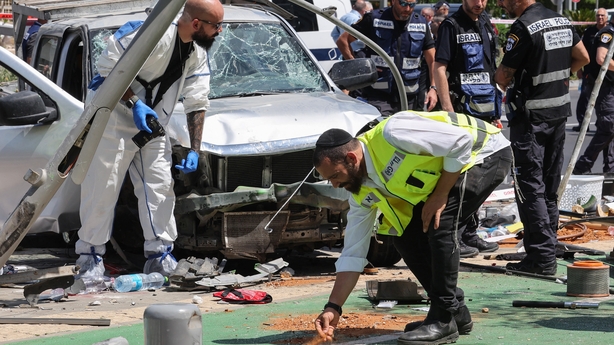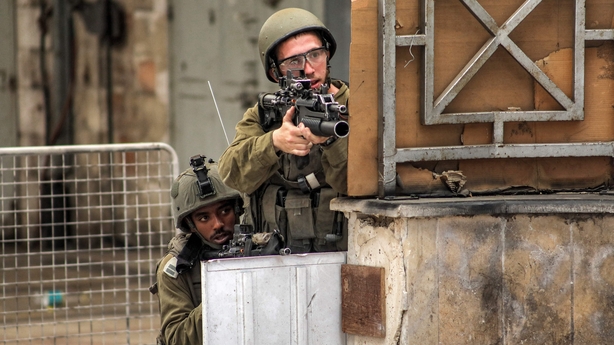Israeli forces have begun withdrawing from the Palestinian city of Jenin tonight, a defence source and Reuters witnesses said, after carrying out one of their biggest military operations in the occupied West Bank for years.
Two Reuters witnesses said they saw convoys of Israeli military vehicles leaving Jenin in what appeared to signal an end to an Israeli operation that began there early yesterday.
Explosions could still be heard in the northern West Bank city amid reports of a gunbattle in or near a Jenin hospital. Reuters could not immediately verify the details of that incident.
The operation, which the army said was aimed at destroying militant infrastructure and weapons in the Jenin refugee camp, was launched with a drone strike yesterday, and over 1,000 troops have been deployed.
At least 12 people have been killed, Palestinian officials said.
"At this moment we are completing the mission, and I can say that our extensive activity in Jenin is not a one-time operation," Israeli Prime Minister Benjamin Netanyahu said at a checkpoint near the city.
The densely populated refugee camp, where some 14,000 people live in less than half a square kilometre, has been one of the focal points of a wave of violence that has swept the West Bank for more than a year, drawing growing international alarm.
A car-ramming and stabbing attack in Israel's business hub Tel Aviv, in which eight people were hurt, today underscored the risk that of a further escalation as happened after a previous raid on Jenin did last month.
The Palestinian Islamist Hamas group said the assailant, who was shot dead at the scene, was one of its members and that the attack was a response to the Jenin operation.

In Jenin, drones circulated overhead and sporadic gunfire and explosions sounded near the refugee camp, which fighters from militant groups including Hamas, Islamic Jihad and Fatah have fortified with a range of obstacles and watching posts to counter regular army raids.
Power and water supplies remained cut off in the camp and in some areas of the city for a second day after bulldozers that ploughed up roads looking for improvised bombs cut power cables and a main water pipe.
Israeli forces uncovered several underground explosives caches, one concealed in a tunnel under a mosque, confiscated 1,000 weapons and arrested 30 suspects, the military said.
Late yesterday, the Palestinian Red Crescent said it had evacuated 500 families from the camp, around 3,000 people, and UN agencies expressed alarm at the scale of the operation.
Trucks brought food, water and other supplies collected by volunteers in the nearby city of Nablus to Jenin where they were distributed at hospitals and social centres to those displaced by the fighting.
Read more: Inside Jenin: Refugee camp at centre of Israeli raid
Jihad Hassan, 63, who fled the camp with his family after his son was wounded, said the drone strike had prompted him to leave.
"You don't hear a sound, you just see the explosion," he said, as he waited with his son at the Jenin Government Hospital. "It is something, when a person is forced to leave their home."
Around 100 people have been injured, 20 of them critically, the Palestinian health ministry said.
The Islamic Jihad faction claimed four of the dead as its fighters. Hamas, another Islamist faction, claimed a fifth.
The status of the others was unclear, although Israeli officials said as far as they were aware, no civilians had been killed.

Many offices and businesses across the Israeli-occupied West Bank closed today in response to calls for a general strike to protest the operation, which the Palestinian Authority has described as a "war crime".
The fighting further underlined once more the lack of any sign of a political solution to the decades-long conflict and international reaction to the operation was mixed.
The US said it respected Israel's right to defend itself but said it was imperative to avoid civilian casualties.
Mohammed Moustafa Orfy, Egypt's permanent representative to the Arab League, said the Jenin operation would hinder efforts to bring reconciliation after months of escalating violence.
Saudi Arabia and Bahrain condemned the operation.
Taoiseach 'deeply concerned' at situation
Speaking to reporters at an ICTU conference in Kilkenny, President Michael D Higgins said the Irish population are better informed on Palestine, because Irish soldiers go there and they come home and they talk in schools about it.
"And I have to say, I hope we don't have to wait all day to hear a statement from the European Union on what is happening in Jenin, people killed, dozens of people injured in a refugee camp where there’s a complete imbalance between the two forces," President Higgins said.
Taoiseach Leo Varadkar has told the Dáil that the Government is "deeply concerned" at the Israeli incursion into Jenin.
Mr Varadkar expressed concern at "the level of violence" by both sides in the conflict.
"The protection of civilians is paramount", he said, and condemned the violence "resolutely".
He was responding to Independent TD Catherine Connolly, who dismissed Mr Varadkar's comments as "incredibly weak".
She said that "we have stood idly by", offering only "strong words" and "empty rhetoric".
So far this year, she said, 133 Palestinians, and 34 more in Gaza, have been killed by the Israeli Defence Forces. She noted that its operation is being referred to as "Home and Garden".
Mr Varadkar said that Ireland has no role in choosing the name of Israeli military operations "inappropriate as they are".
Sinn Féin's spokesperson on foreign affairs Matt Carthy called for the attack on Jenin to be condemned in the strongest possible terms, and debated in the Dáil.
Solidarity-PBP TD Richard Boyd Barrett accused the Government of getting more involved in "the industry of death and destruction in Europe", which arms Israel.
Labour Party leader Ivana Bacik described the IDF's actions as "outrageous".

